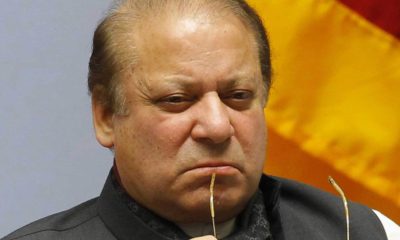World
‘Green Pakistan Programme’ will see 100 million more trees

 Islamabad: Prime Minister Nawaz Sharif has approved launching of the “Green Pakistan Programme” whereby over 100 million trees will be planted all across the country, the media reported on Saturday.
Islamabad: Prime Minister Nawaz Sharif has approved launching of the “Green Pakistan Programme” whereby over 100 million trees will be planted all across the country, the media reported on Saturday.
The idea, according to a press statement released by the Prime Minister’s Office on Friday, is based on the “Great Green Wall Programme” of China — a series of human-planted wind-breaking forest strips designed to stop the expansion of the Gobi Desert, Dawn online reported.
The programme targets to add 100 million plants over the next five years all over the country.
The prime minister has approved the launch of to improve forestry and wildlife sectors.
Protection and management of wildlife and reclaiming and developing forest areas are the main aspects of the programme, the statement said.
Preservation and management of forest and wildlife resources of the country need to be adequately developed in line with the best international practices.
All relevant federal and provincial ministries and agencies will be facilitated to fulfil the task so that the desired objectives of forests preservation and wildlife protection is achieved, the statement quoted the prime minister as saying.
The prime minister has asked the climate ministry to develop a proposal for strengthening Zoological Survey of Pakistan to immediately undertake inventory of endangered wildlife species and habitats across Pakistan.
He issued directions for the revival and management of internationally recognised wildlife habitats, including Khunjrab National Park (Gilgit Baltistan), Khirthar National Park (Sindh), Hingol National Park (Balochistan), Chitral Gol National Park (Khyber Pakhtunkhwa), Lal Suhanara National Park and Salt Range area (Punjab), Machiara National Park (Pakistan occupied Kashmir) and Margalla Hills National Park (Islamabad).
World
Lockdowns in China Force Urban Communities to Defy Censorship and Vent Frustration Online

Shanghai’s rich middle class is leading a wave of online dissent over the strict and prolonged lockdowns imposed in various parts of the country. Chinese internet censorship is struggling as patience is wearing thin in many urban centers, coming up with creative forms of online protests.
Social Media Posts Revealing Lockdown Tension in Shanghai
Drawn-out lockdowns are nothing new in China as authorities insist with the nation’s zero-Covid policy since the start of the pandemic. Currently over This time around, however, metropolitan areas like Shanghai are increasingly difficult to keep quiet, given that its more than 25 million residents have seen weeks of total isolation along with food shortages and many other service interruptions.
Dozens of towns and reportedly over 300 million Chinese citizens have been affected by lockdowns of different severity. As expected, urban netizens have been most outspoken over their difficulties by finding creative ways to get around state censorship and bans placed on topics, news comments and spontaneous campaigns.
Shanghai residents have been using mobile proxies and hijacking seemingly unrelated hashtags to talk about healthcare issues, delivery failures and the overall severity of their situation. The “positive energy” that the Chinese government wants to transmit during the recent prolonged series of lockdowns does not come naturally to those counting food supplies and online censors are working hard to filter words, trending topics and undesired social media sharing.
WeChat groups and message threads are under constant monitoring. Posts questioning the zero-Covid approach have been quickly deleted, including by leading Chinese health experts like Dr. Zhong Nanshan. Video footage is soon censored and protests and investigations are quickly made to disappear.
Where this has not worked, officials have exposed banners with warnings and outright threats like “watch your own mouth or face punishment”, while drones have been patrolling the city skies. Yet, if anything, this has led to further tensions and unspoken confrontation with Shanghai’s educated and affluent middle class.
Creative Online Solutions Harnessing Civic Energy
Announcements by Chinese social media that they would be publishing the IP addresses of users who “spread rumors” have not helped either. Tech industry research has shown that much of Asia’s tech-savvy population has a habit of using mobile proxies and other privacy tools, quickly finding workarounds to browse the internet freely and talk to the world about the hottest topics.
The sheer volume of forbidden posts is already a challenge for the very censorship system, experts explain. Unable to track all trending hashtags, state workers overlook topics that speak about the US, Ukraine or other popular news. Linking human rights elsewhere to their situation, Chinese online dissidents establish their informal channels and “hijack” the conversation to share personal or publicly relevant information about the Covid suppression in their town.
Sarcastic and satirical posts still dominate. Others hope to evade the censors by replacing words from famous poems or the national anthem. One thing is certain – social media, when harnessed with the right creativity, has proven its ability to mount pressure on the government in even some of the most strictly controlled tech environments like China.























